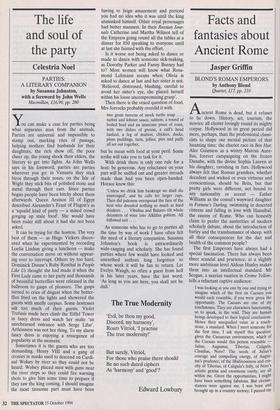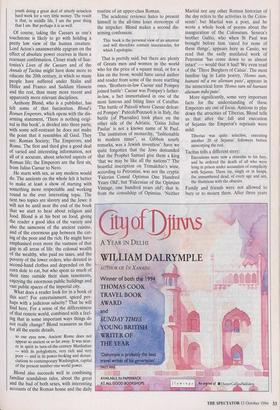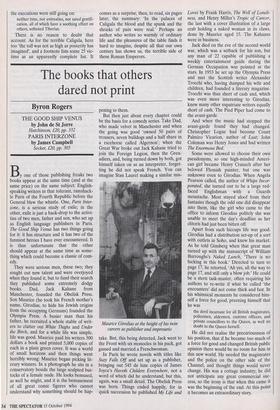Facts and fantasies about Ancient Rome
Jasper Griffin
BLOND'S ROMAN EMPERORS by Anthony Blond Quartet, £17, pp. 210 Ancient Rome is dead, but it refuses to lie down. History, art, tourism, the movies: all cluster lovingly round its mighty corpse. Hollywood in its great period did more, perhaps, than the professional classi- cists to shape our mental picture of that haunting time: the chariot race in Ben Hur; Alec Guinness as a wintry Marcus Aure- lius, forever campaigning on the frozen Danube, with the divine Sophia Lauren as his daughter, ravishing in furs. Hollywood always felt that Roman grandees, whether decadent and wicked or even virtuous and conscientious, should be Brits, but that pretty girls were different, not bound to any nationality or accent — Esther Williams as the consul's wayward daughter in Fortune's Darling, swimming in deserted cisterns and falling in love with Hannibal, the enemy of Rome. Who can honestly claim to prefer the austerities of modern scholarly debate, about the introduction of barley and the transhumance of sheep, with all their consequences for the diet and health of the common people?
The first Emperors have always had a special fascination. There has always been sheer scandal and prurience; at a slightly more ambitious level Aldous Huxley makes them into an intellectual standard. Mr Scogan, a saurian vaurien in Crome Yellow, tells a reluctant captive audience: I was looking at you one by one and trying to imagine which of the first six Caesars you would each resemble, if you were given the opportunity. The Caesars are one of my touchstones. They are characters functioning, so to speak, in the void. They are human beings developed to their logical conclusions. Hence their unequalled value as a touch- stone, a standard. When I meet someone for the first time, I ask myself this question: given the Caesarean environment, which of the Caesars would this person resemble — Julius, Augustus, Tiberius, Caligula, Claudius, Nero? The seeds of Julius's courage and compelling energy, of Augus- tus's prudence, of the libidinousness and cru- elty of Tiberius, of Caligula's folly, of Nero's artistic genius and enormous vanity, are all within me. Given the opportunities, I might have been something fabulous. But circum- stances were against me. I was born and brought up in a country rectory; I passed my youth doing a great deal of utterly senseless hard work for a very little money. The result is that, in middle life, I am the poor thing that I am. But perhaps it is as well.
Of course, taking the Caesars as one's touchstone is likely to go with holding a pretty low view of the human creature. Lord Acton's unanswerable epigram on the effect of absolute power receives in them a resonant confirmation. Closer study of Sue- tonius's Lives of the Caesars and of the Annals of Tacitus might have done more to educate the 20th century, in which so many people have suffered under Stalin and Hitler and Franco and Saddam Hussein and the rest, than many more recent and apparently more relevant disciplines.
Anthony Blond, who is a publisher, has felt some of that fascination. Blond's Roman Emperors, which opens with the dis- arming statement, 'There is nothing origi- nal in this book', is divided into three parts; with some self-restraint he does not make the point that it resembles all Gaul. They are: Roman Society; The Emperors; and Rome. The first and third give a good deal of varied and interesting information, not all of it accurate, about selected aspects of Roman life; the Emperors are the first six, from Julius Caesar to Nero.
He starts with sex, as any modern would do. The ancients on the whole felt it better to make at least a show of starting with something more respectable and working round to the ever interesting topic. The next two topics are slavery and the Jews: it will not be until near the end of the book that we start to hear about religion and food. Blond is at his best on food, giving the reader a good idea of the variety and also the sameness of the ancient cuisine, and of the enormous gap between the eat- ing of the poor and the rich. He might have emphasised even more the vastness of that gap in all areas of life: the colossal wealth of the wealthy, who paid no taxes, and the poverty of the lower orders, who dressed in second-hand clothes and depended on the corn dole to eat, but who spent so much of their time outside their slum tenements, enjoying the enormous public buildings and vast public spaces of the imperial city. What does a reader look for in a book of this sort? For entertainment, spiced per- haps with a judicious salacity? That he will find here. For a sense of the differentness of that remote world, combined with a feel- ing that in some important ways things do not really change? Blond reassures us that for all the exotic details,
to our eyes now, Ancient Rome does not appear so ancient or so far away. It was near- er in spirit to turn-of-the-century Manhattan — with its polyglottery, very rich and very poor — and in its power-braking and denun- ciations to contemporary Washington, capital of the present number one world power.
Blond also succeeds well in combining familiar scandalous tales, about the great and the bad of both sexes, with interesting accounts of the Roman house and the daily routine of an upper-class Roman.
The academic reviewer hates to present himself in the all-time loser stereotype of the nitpicker. Blond makes a second dis- arming confession: This book is the personal view of an amateur and will therefore contain inaccuracies, for which I apologise.
That is prettily said; but there are plenty of Greats men and women in the world who for the price of a square meal, or for a kiss on the brow, would have saved author and reader from some of the more startling ones. 'Brothers-in-law Caesar and Pompey joined battle': Caesar was Pompey's father- in-law, a fact immortalised in one of the most famous and biting lines of Catullus. `The battle of Puteoli where Caesar defeat- ed Pompey': Puteoli/Pozzuoli is in Italy, the battle (of Pharsalus) took place on the other side of the Adriatic. 'Gains Julius Paulus' is not a known name of St Paul. `The institution of monarchy, "fashionable in modern times", as Gibbon sourly remarks, was a Jewish invention': have we quite forgotten that the Jews demanded that the Prophet Samuel give them a king `that we may be like all the nations'? The boastful inscription on Trimalchio's wine, according to Petronius, was not the cryptic `Falerian Consul Optimus One Hundred Years Old', but 'Falernian of the Opimian Vintage, one hundred years old'; that is, from the consulship of Opimius. 'Neither
Martial nor any other Roman historian of the day refers to the activities in the Colos- seum': but Martial was a poet, and he wrote a whole book of poems about the inauguration of the Colosseum. Seneca's brother Gallio, who when St Paul was brought before him 'cared for none of these things', appears here as Cassio; we read that the sadly mutilated work of Petronius 'has come down to us almost intact' -- would that it had! We even read of the 'Three Burghers of Calais'. The most familiar tag in Latin poetry, 'Homo sum, humani nil a me alienum puto', appears in the unmetrical form 'Homo sum nil humani alienum mihi puto'.
More significantly, some very important facts for the understanding of these Emperors are out of focus. Anxious to play down the atrocities of Tiberius, Blond tells us that after the fall and execution of Sejanus the Emperor's reprisals were mild: Tiberius was quite selective, executing another 20 of Sejanus' followers before amnestying the rest.
Tacitus tells a different story: Executions were now a stimulus to his fury, and he ordered the death of all who were lying in prison under accusation of complicity with Sejanus. There lay, singly or in heaps, the unnumbered dead, of every age and sex, the illustrious with the obscure.
Family and friends were not allowed to bury or to mourn them. After three years the executions were still going on:
neither time, nor entreaties, nor sated gratifi- cation, all of which have a soothing effect on others, softened Tiberius.
There is no reason to doubt that account. As for the terrible Caligula, here too 'the toll was not as high as posterity has imagined', and a footnote lists some 25 vic- tims as an apparently complete list. It comes as a surprise, then, to read, six pages later, the summary; 'In the palaces of Caligula the blood and the spunk and the shrieks of pain were real.' Perhaps an author who writes so warmly of ordinary life and the pleasures of the table finds it hard to imagine, despite all that our own century has shown us, the terrible side of these Roman Emperors.




























































 Previous page
Previous page